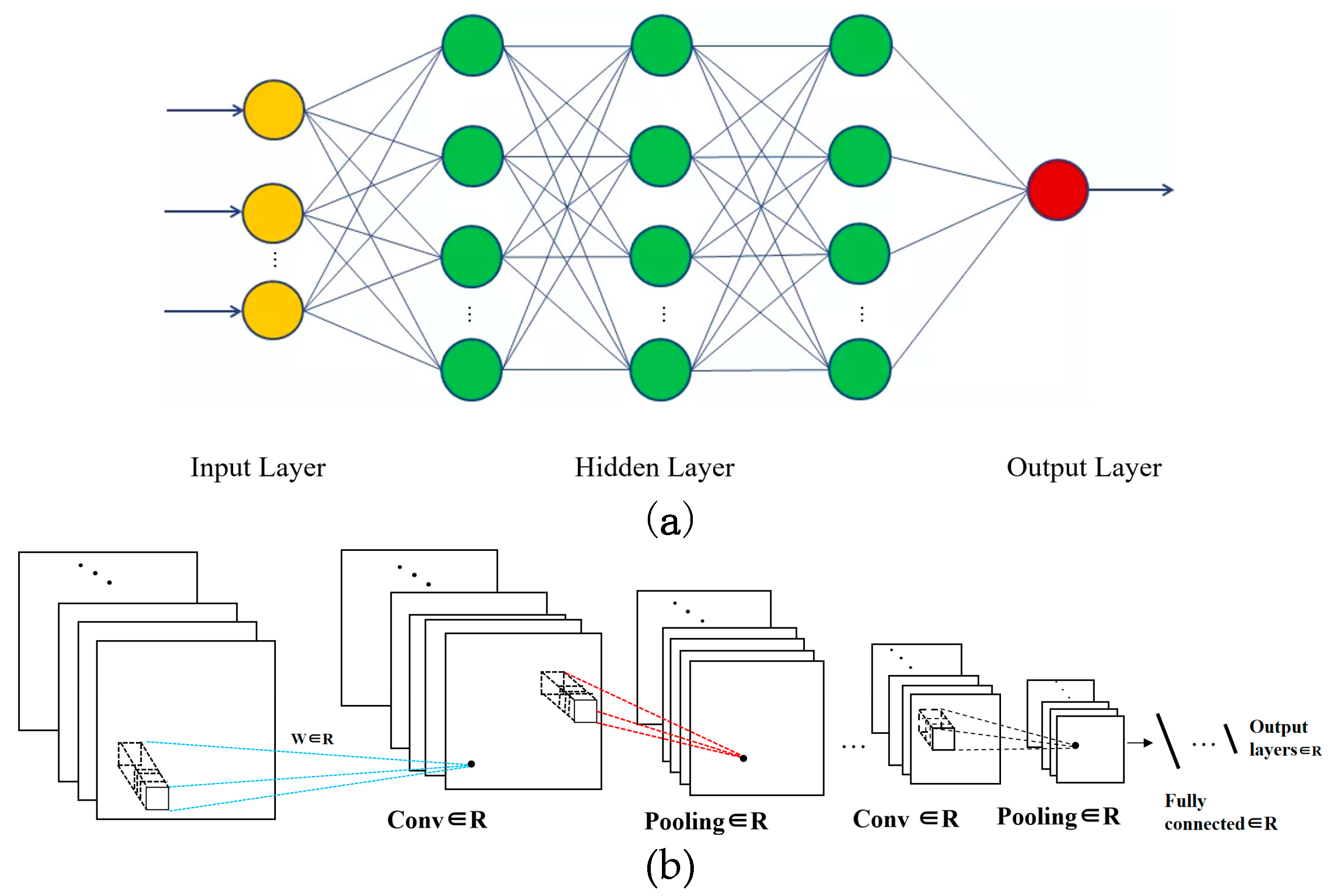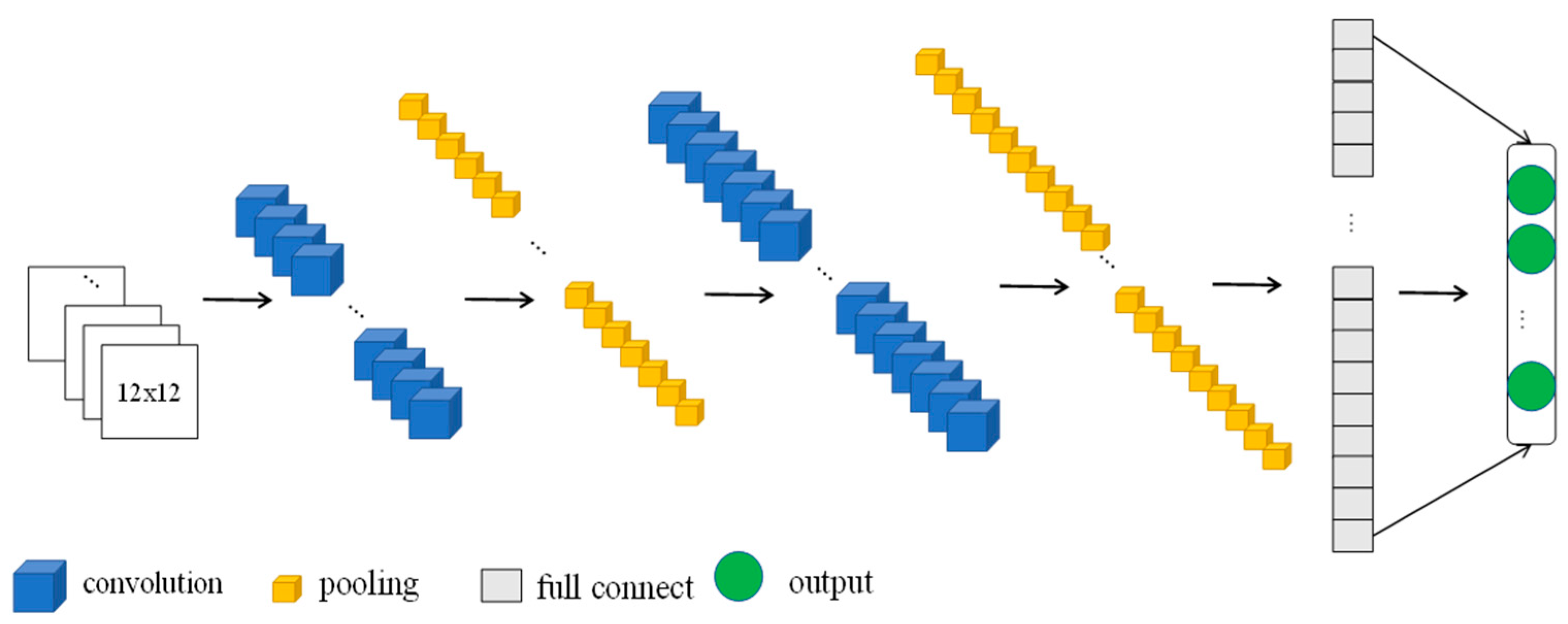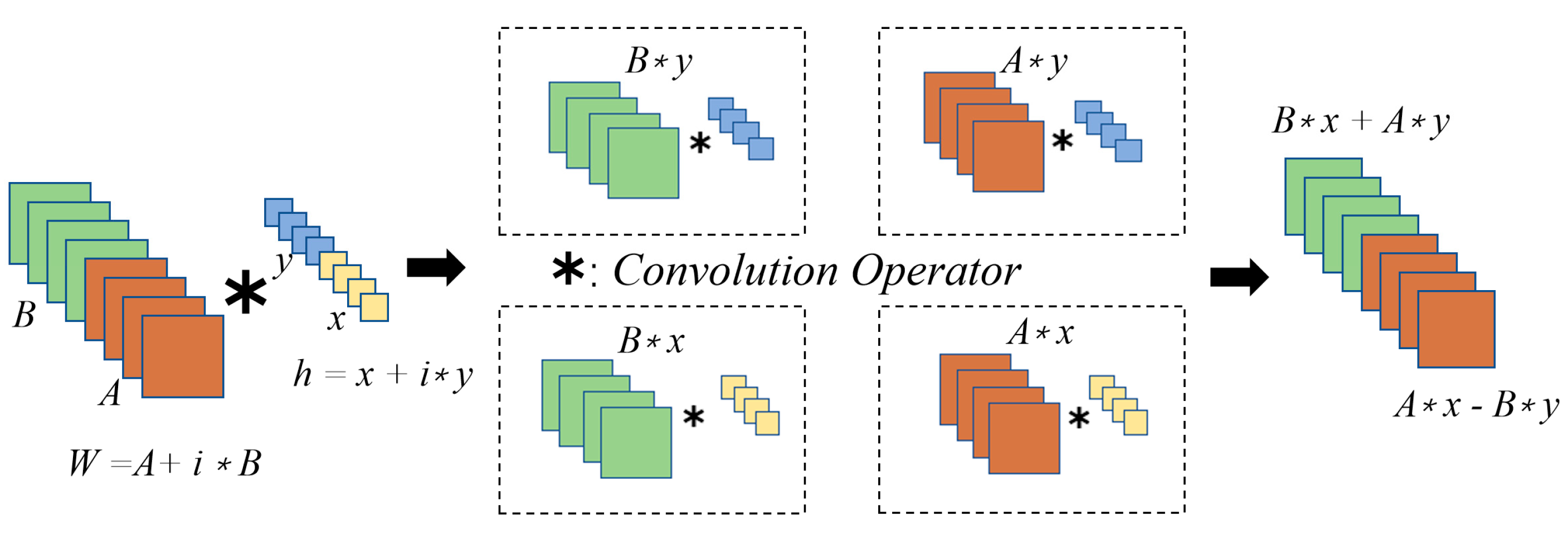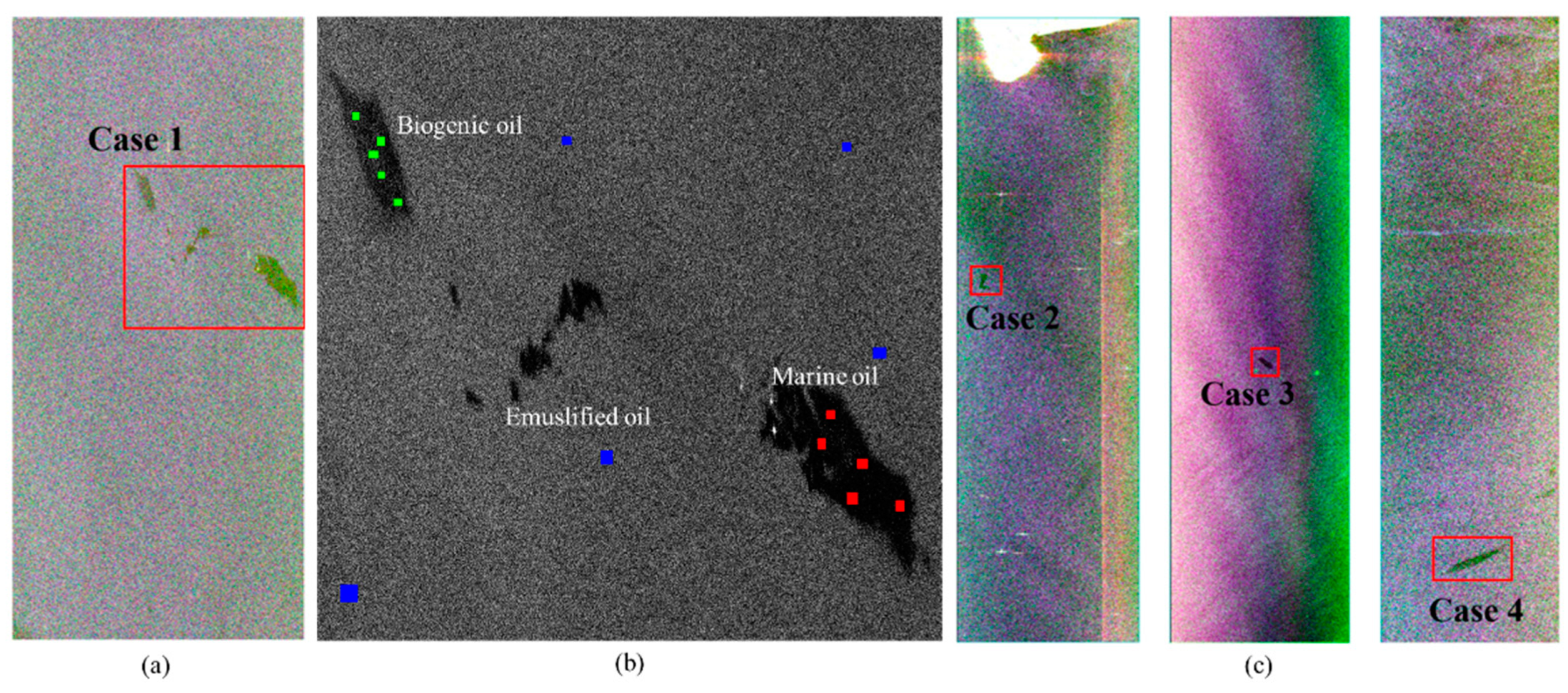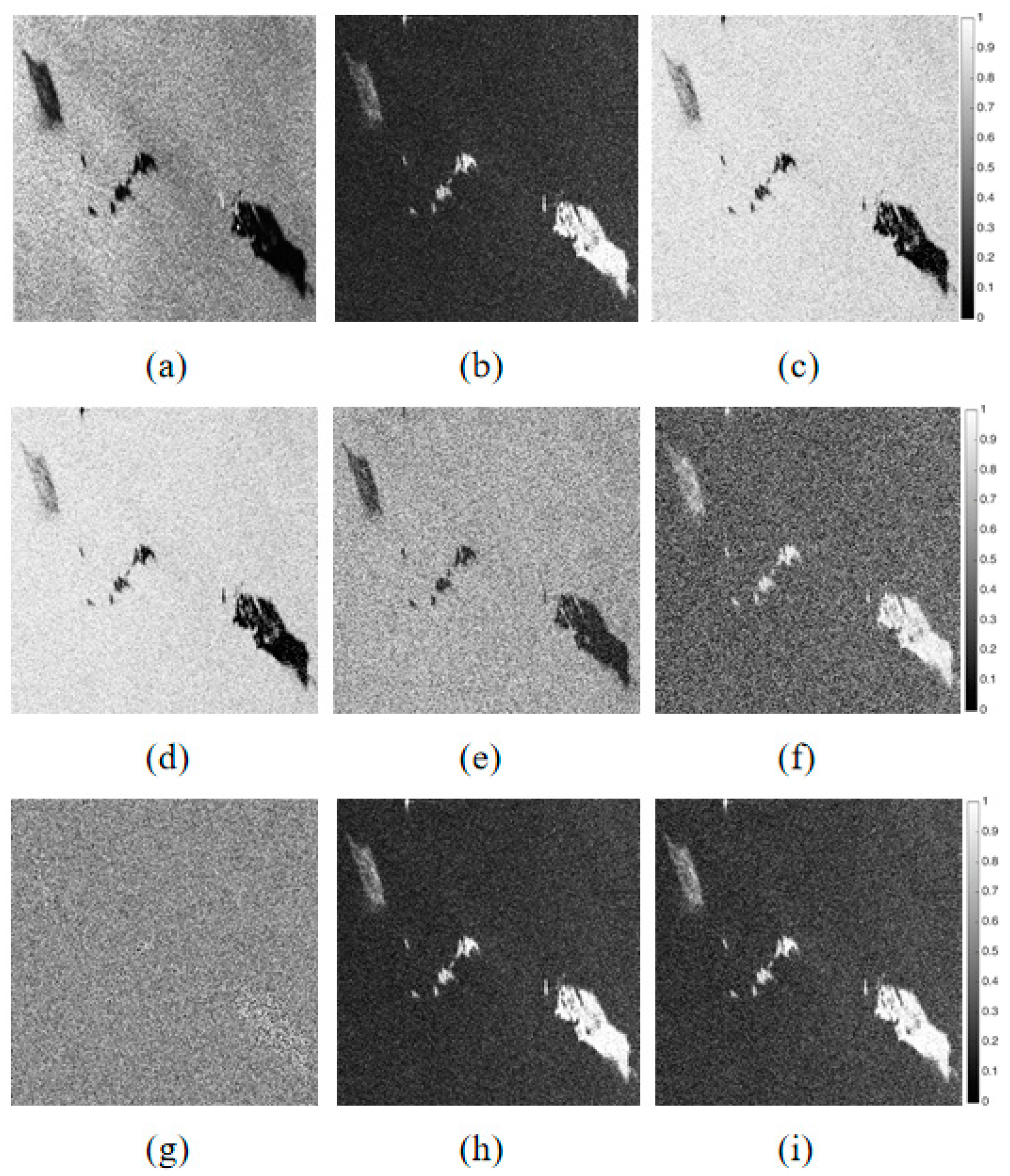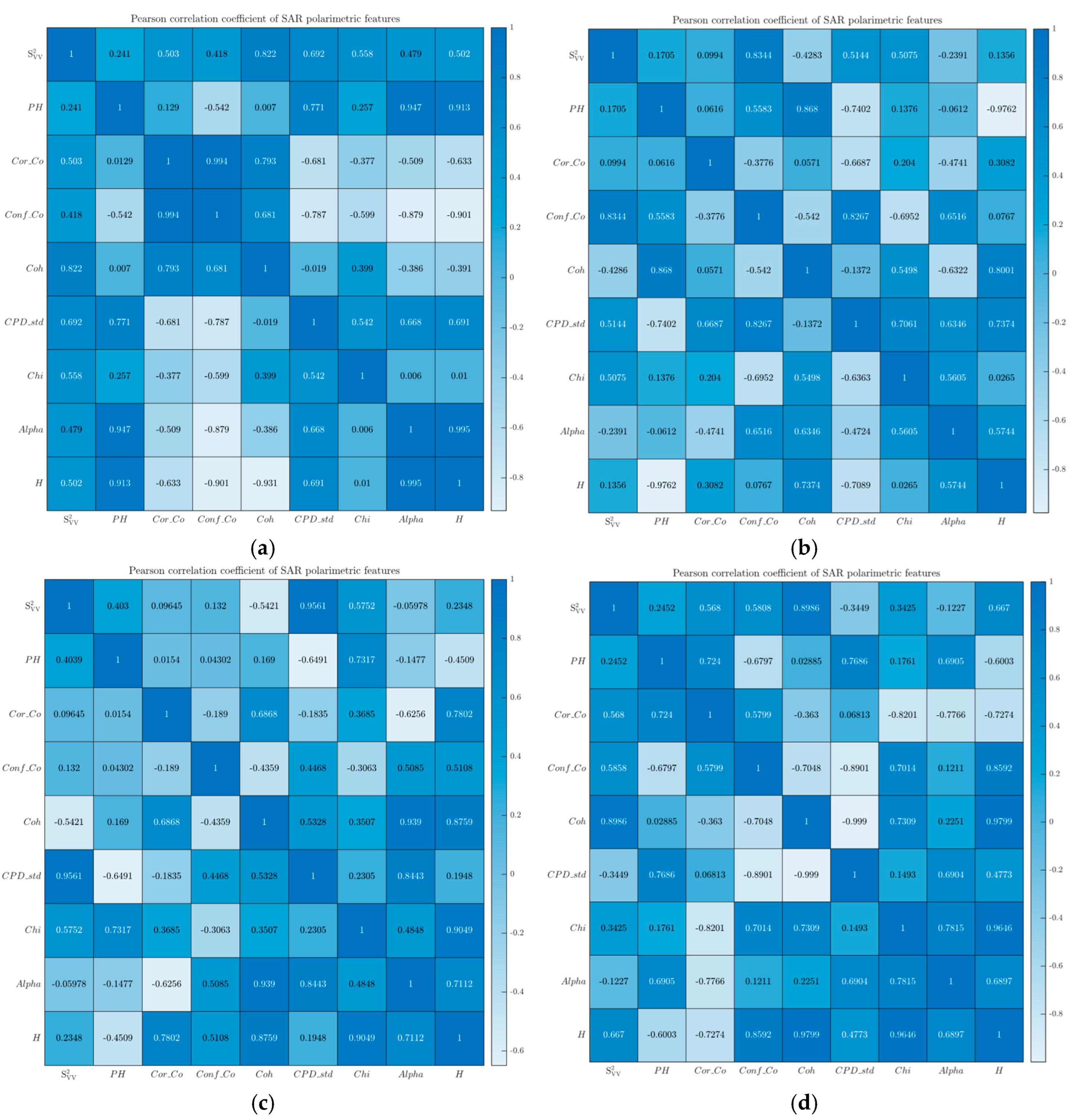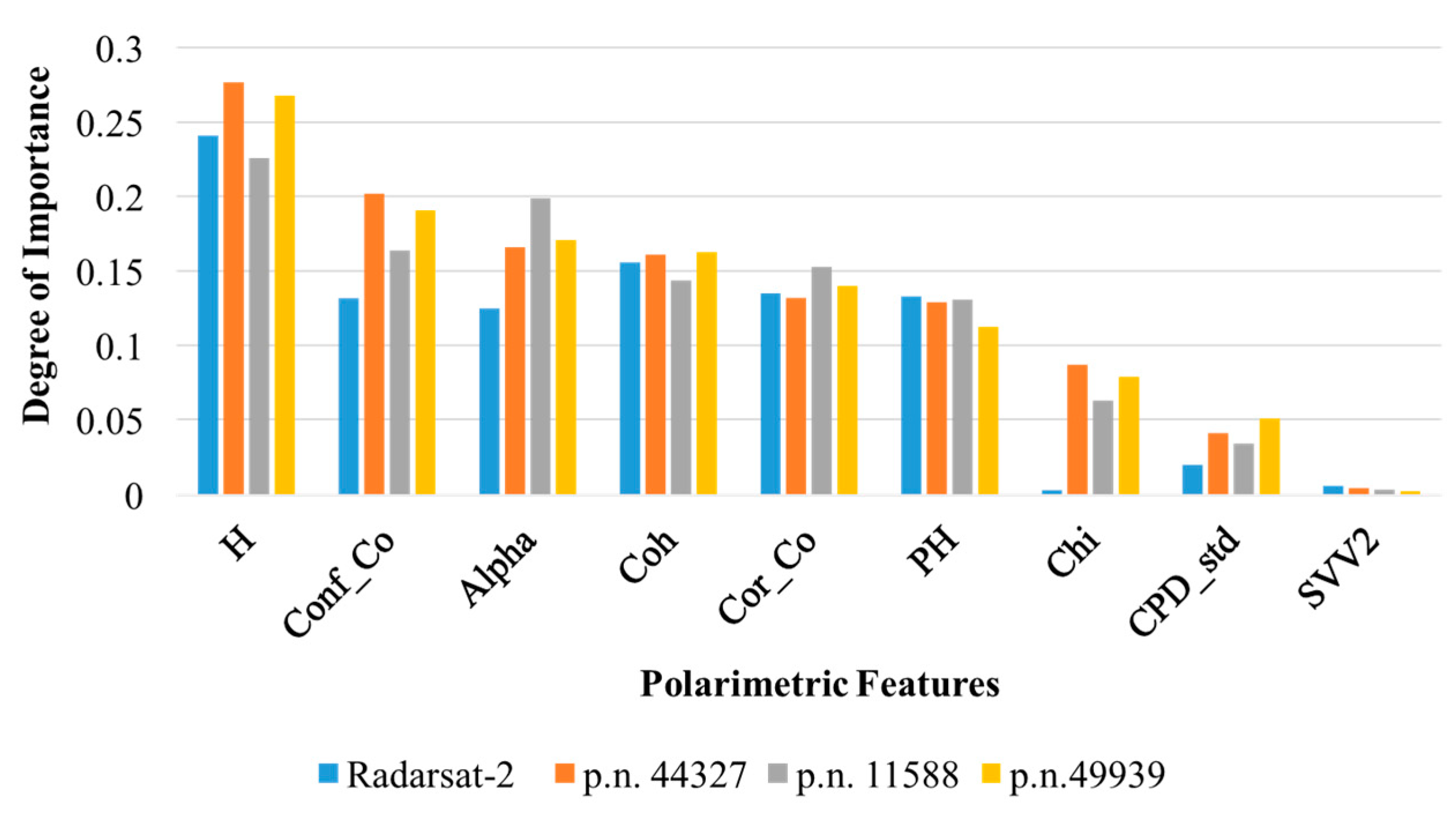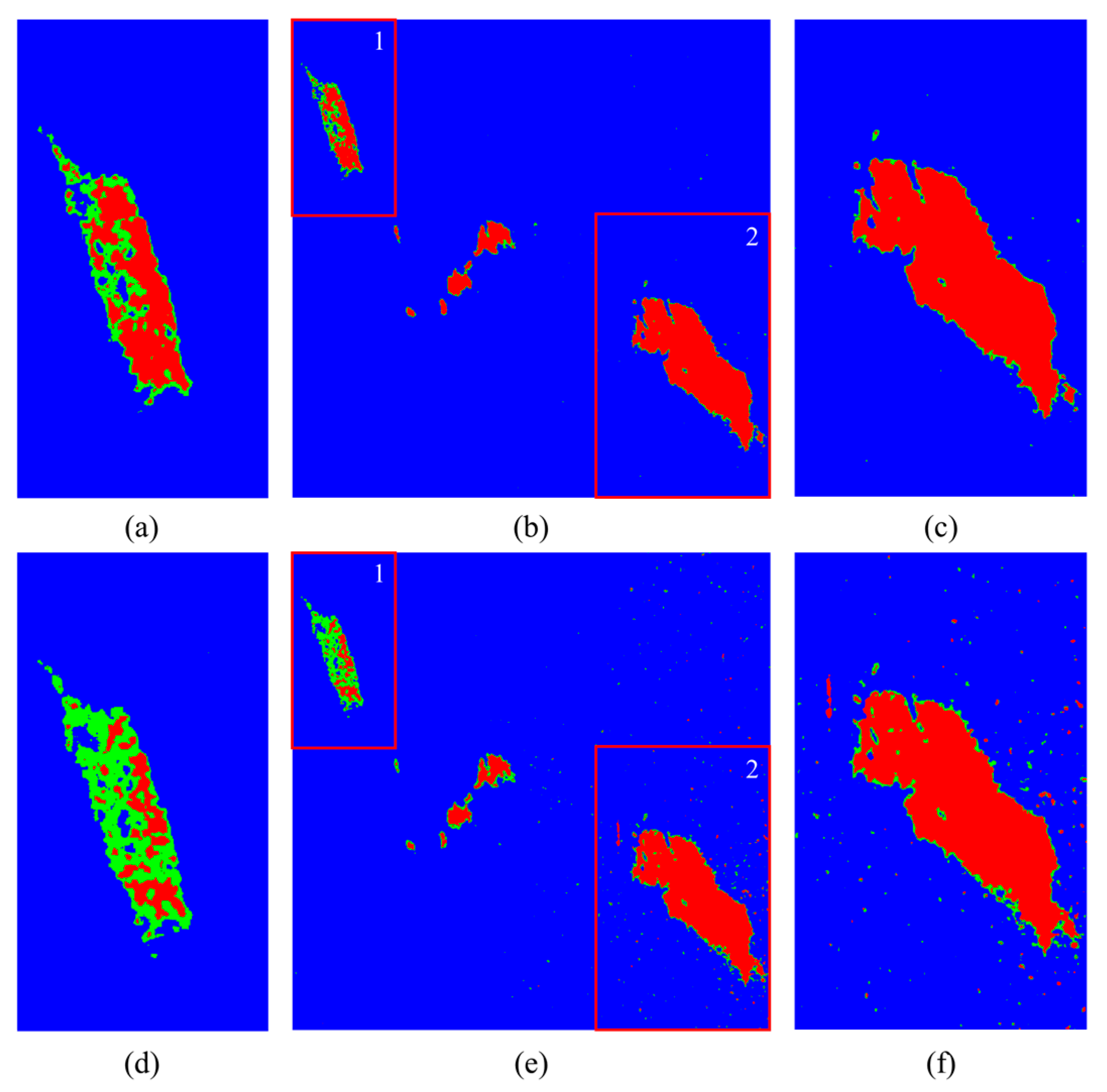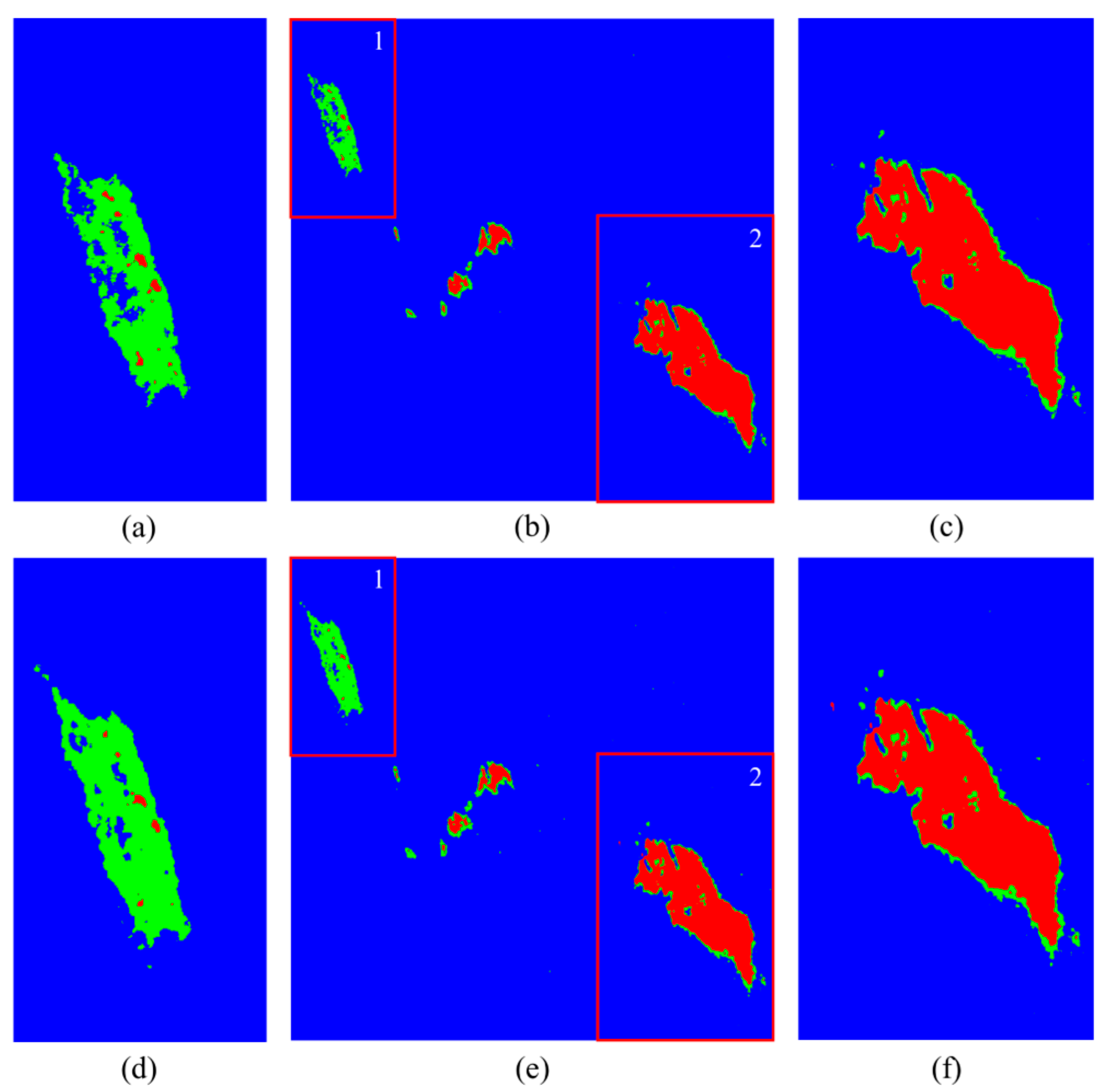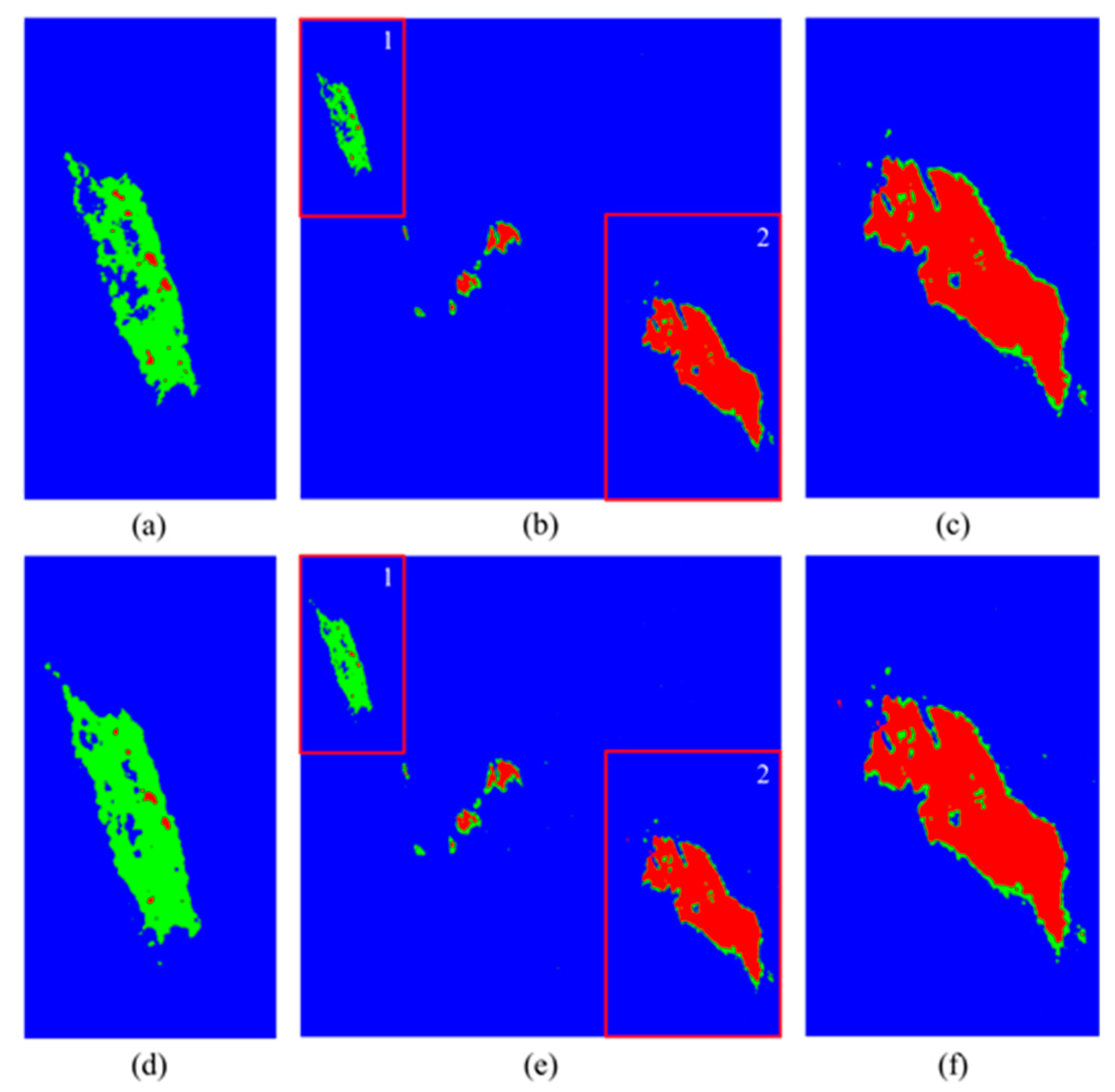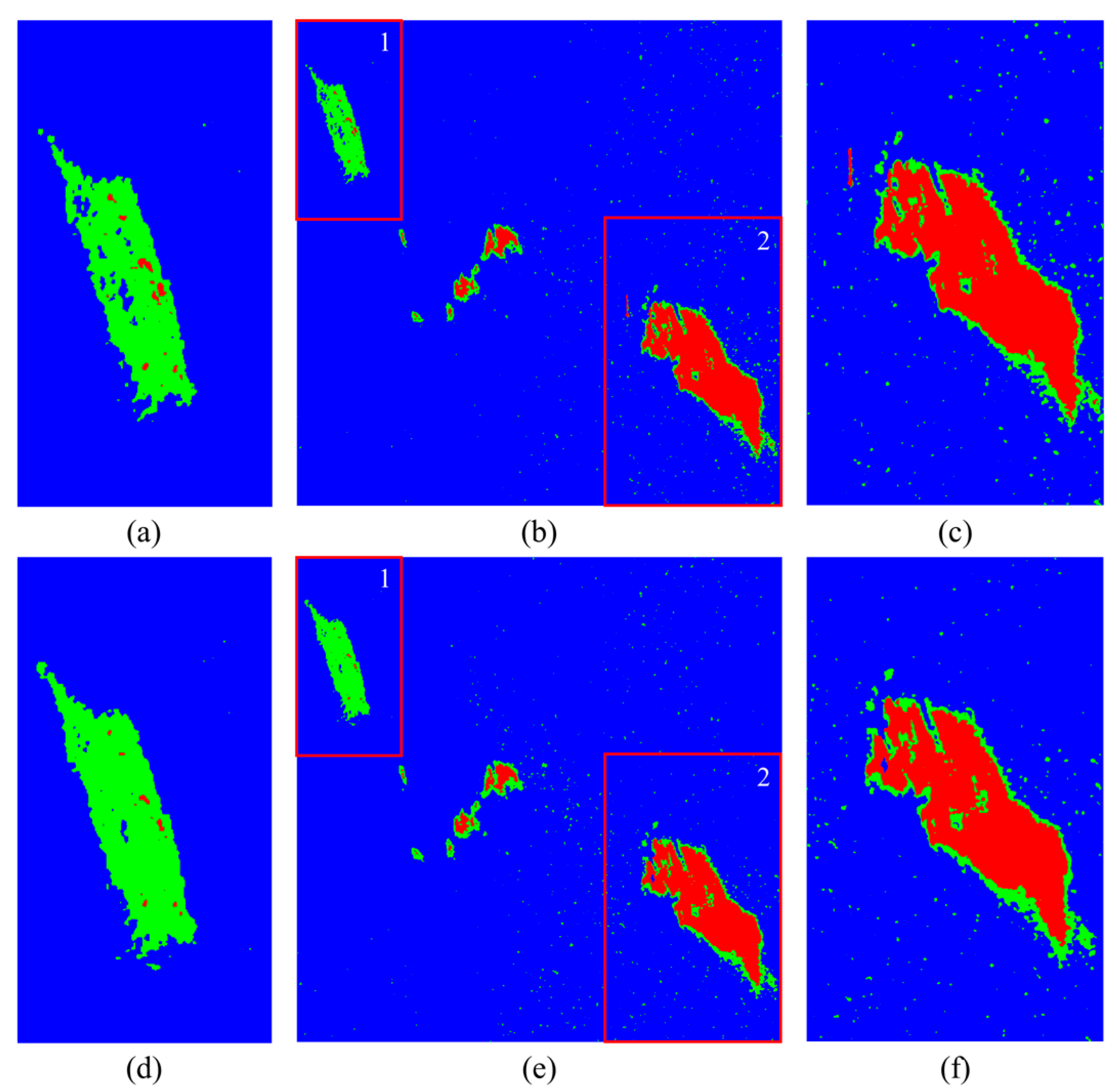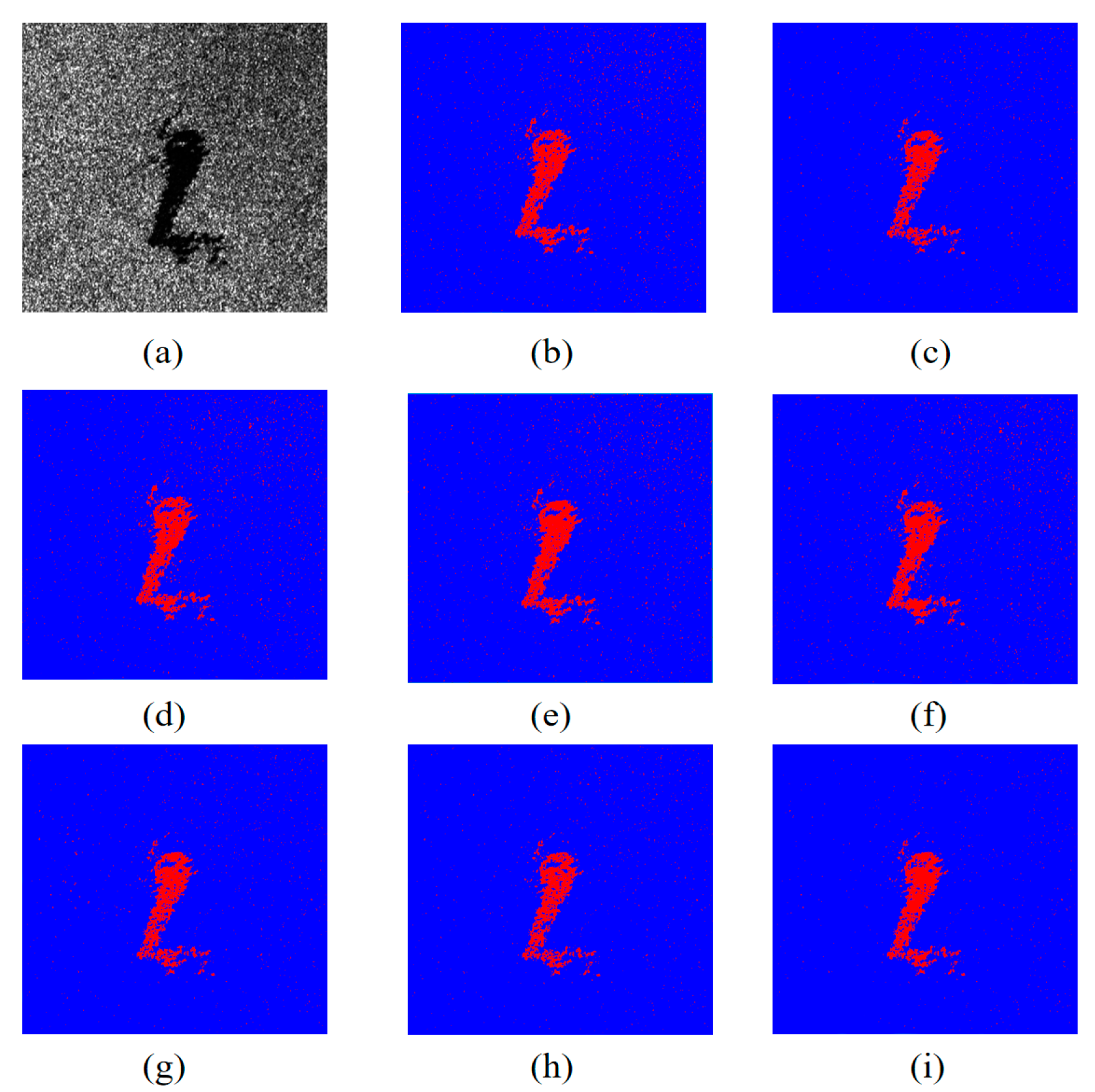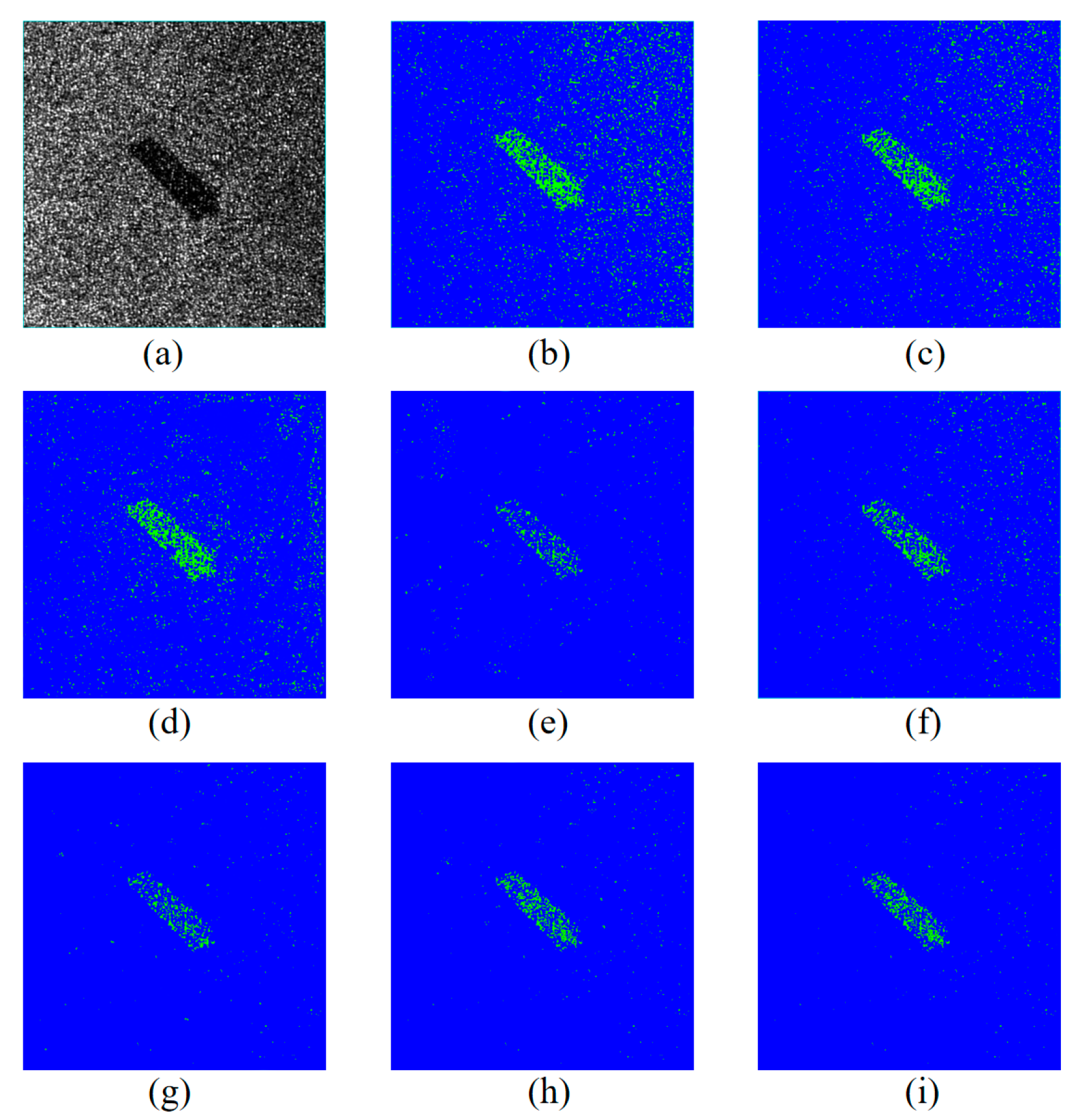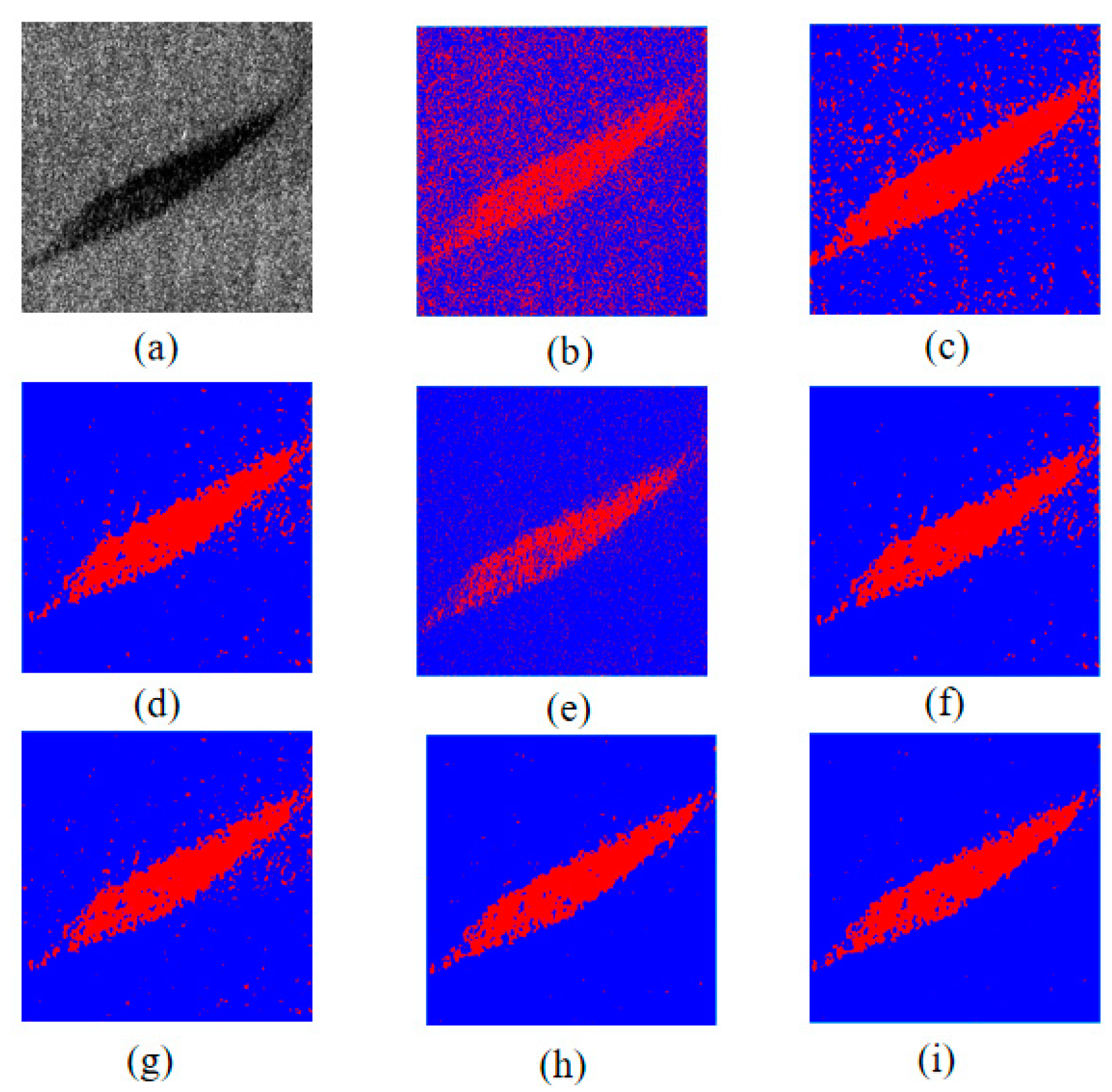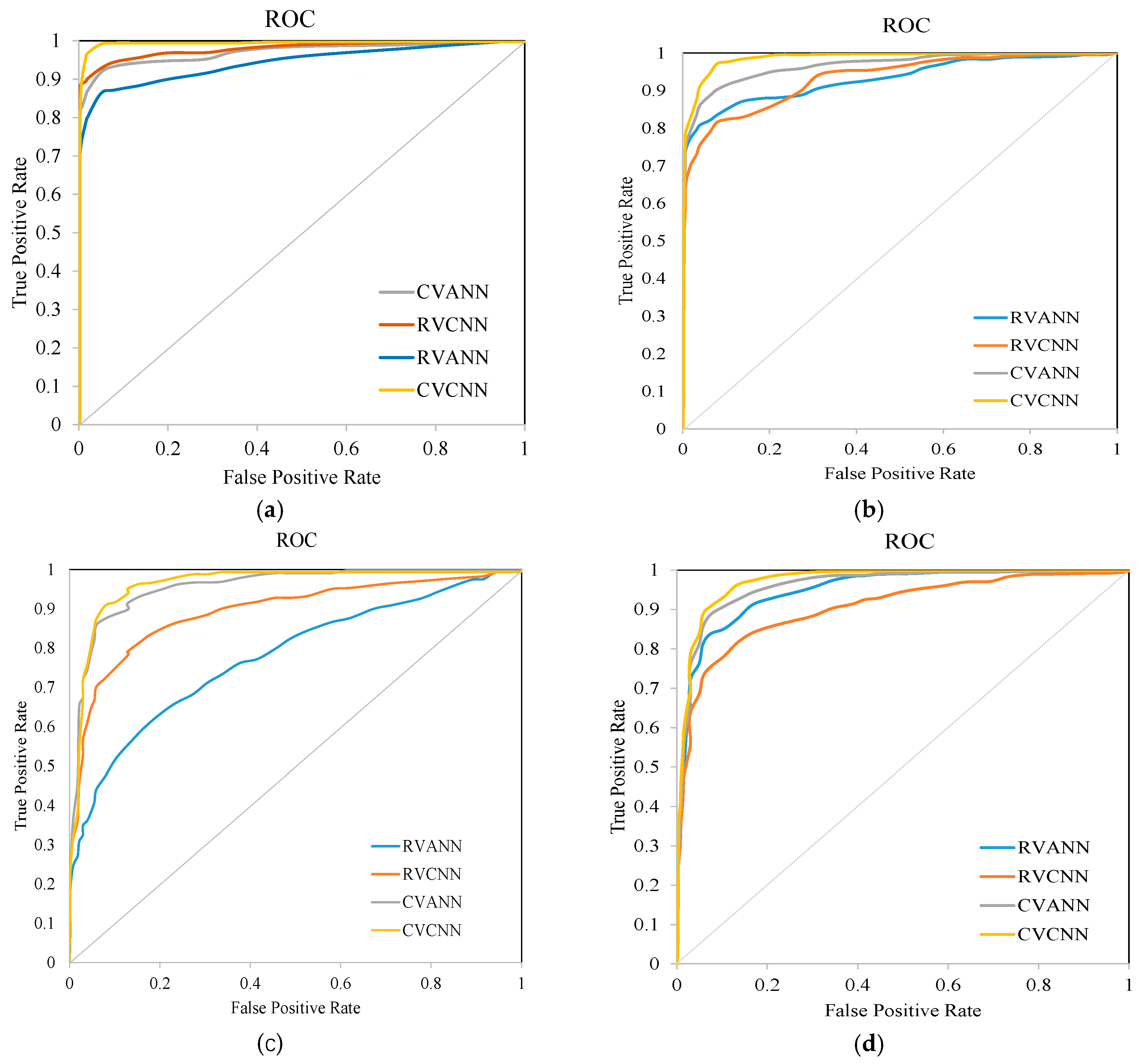2.1. Polarimetric SAR Features
The fully (or quad-) polarimetric SAR system transmits and receives radar signals under horizontal and vertical polarization bases. In this study, the coherence matrix T derived from fully polarimetric SAR data is considered:
Assuming reflection symmetry, equals to . The coherence matrix T contains three real-valued elements (diagonal elements) , , and three complexed valued elements (off-diagonal elements) , , . In this paper, the upper triangular elements of the coherence matrix T are analyzed.
To better describe the scattering mechanism of the sea surface, many features with specific physical significance have been proposed for SAR marine oil spill detection. In this study, the following commonly used features are considered.
(a) Intensity of co-polarized channel
The intensity of the co-polarized channel is a common feature for oil spill detection by single-polarimetric SAR systems. In previous studies, it is believed that generally the signal-to-noise ratio of on the sea surface is higher than that of . Oil spill-covered area has very low radar backscatter due to the damping of surface waves, therefore the intensity of the co-polarized channel is suppressed. However, it is usually challenged by its limitation in distinguishing biogenic look-likes and other physical phenomena that may also result in low backscatter.
(b) H/α Decomposition Parameters
H/α is derived based on the eigenvalue decomposition of the coherency matrix of the target [
16]. The three eigenvalues of the coherency matrix
T are arranged as
,
U3 is the unitary matrix, whose column vectors,
,
and
are the eigenvectors of
T.
Then the probabilities can be calculated from the three eigenvalues:
Hence, the polarization entropy can be derived by:
The mean polarization scattering angle α is defined by:
The entropy
H is a measure of the randomness of the polarization scatter mechanism within the resolution cell. It is base-invariant and closely related to the eigenvalue
λ of the coherence matrix, which represents different components of the total scatter power. For a clean sea surface, Bragg scattering dominates, so
H is close to 0. While for oil slick-covered areas, the scattering mechanism gets much more complex, and the stronger random scattering results in higher entropy. However, for biogenic slicks, although the scattering power is lower, the main scattering mechanism is still Bragg [
17], resulting in low entropy similar to a clean sea surface. Therefore, H can be used to distinguish oil slicks and weak damping look-alikes. [
17] The mean scattering angle α represents the main scattering mechanism of the target. On slick-free marine surfaces, α is usually less than 45° as the Bragg scattering is dominant. In slick-covered regions, a more complex scattering mechanism is present and much larger α can be measured.
(c) Ellipticity χ
Ellipticity
χ describes the polarimetric ellipse’s shape of the scattered EM wave:
where
S3 is the element of Stokes vector and m stands for the degree of polarization of the received EM wave.
χ can be employed as an indicator of the scattering mechanism. For slick-free sea surfaces where Bragg scattering is dominant, the sign of
χ is negative. For oil-covered sea surfaces, as a more random scattering mechanism is present,
χ will be larger and can become positive [
18]. This feature makes
χ a logical binary descriptor of slick-free vs. oil-covered areas.
(d) Pedestal Height
In the co-polarized signature of the scene, the normalized radar cross-section (NRCS)
σ0 is a function of both the tilting angle
Φ and the ellipticity
χ of the polarization ellipse. The pedestal height (PH) is defined as the lowest value
σ0 in the co-polarized signature when the tilting angle
Φ and the ellipticity
χ change. The PH describes the unpolarized energy of the total scattering power and behaves as a pedestal on which the co-polarized signature is set [
19]. The normalized pedestal height (NPH) can be defined as the minimum eigenvalue divided by the maximum eigenvalue:
For a clean sea surface, the scattering mechanism is pure Bragg, so an NPH value close to 0 is expected. While for the oil-covered area, much higher NPH can be expected due to the non-Bragg scattering that reflects a more diverted scattering mechanism.
(e) Co-Polarized Phase Difference
The co-polarized phase difference (CPD) is defined as the phase difference between the HH and VV channels [
7]:
From multi-looked SAR data, it can be also derived as:
where arg(*) stands for phase calculation.
The standard deviation of CPD is a very efficient parameter indicating sea surface scattering mechanisms [
7]. It can be counted from
using a sliding window. On slick-free sea surfaces, the correlation between HH and VV channels is high, and a narrow CPD distribution is expected. This results CPD in having a small standard deviation, and it is the same for weak-damping (biogenic slicks)-covered areas. In marine oil slicks-covered regions, the Bragg scattering is weakened while other scattering mechanisms increase, and the HH-VV correlation largely decreases. As a result, the pdf of CPD becomes broader, and its standard deviation largely increases.
(f) Conformity Coefficient
The conformity coefficient was first used in compact polarimetric SAR applications for soil moisture estimations [
20]. In a full polarization scheme, its proxy is defined as [
21]:
The conformity coefficient μ evaluates whether surface scattering is dominant among all the scattering mechanisms. For a slick-free sea surface, Bragg scattering results in a very small cross-polarized backscattering power and results in high HH-VV correlation: ; hence, μ is positive. However, for hydrocarbon(biogenic oil)-covered areas, as non-Bragg scattering exists, HH-VV correlation is lower, and cross-pol component largely increases, which is very likely to have: , resulting in negative μ. For weak-damping cases such as biogenic slicks, since Bragg scattering is still dominant, is still valid and results in positive μ. Under this rationale, conformity coefficients can be used to effectively distinguish hydrocarbon slicks from biogenic slicks.
(g) Correlation and Coherence Coefficients
The correlation and coherence coefficients are derived from the coherence matrix by [
8]:
where
is an element of the coherence matrix
T.
These two parameters both range between 0 and 1. For a slick-free area, HH and VV channels are highly correlated, so they are expected to be very close to 1. For an oil-covered sea surface, a much lower HH/VV correlation is expected, so the correlation and coherence coefficients are both much lower.
2.4. Procedure of the Experiments
The procedure of the whole study is presented in
Figure 4.
Firstly, the original Radarsat-2 and SIR-C SAR data were preprocessed, including ROI cropping and Refined Lee filtering, to concentrate on the target and obtain images with lower speckle noise.
Secondly, nine classical polarization features were extracted from the pre-processed SAR data, and a feature selection framework was built based on the Pearson correlation coefficient, J-S divergence and ReliefF algorithm to decide the optimal combination of polarization features for marine oil spill classification.
Thirdly, real and complex-valued feature sets were generated. Based on the feature selection results, the combined feature sets were established to evaluate the contribution of these scattering mechanism based polarimetric features.
Fourthly, oil spill classification were conduced. A CVCNN model for oil spill classification is proposed, and the basic procedure of the network model is derived, including parameter initialization, complex-valued convolution, complex-valued pooling, complex-valued full connection, and output. The backpropagation, Batch Normalization layer and activation function are also adjusted to complex-valued data flow. RVANN, RVCNN and CVANN models were also evaluated for comparative study.
The K-fold cross-validation is used to evaluate the performance of the proposed CVCNN and other models in marine oil spill classification based on polarimetric SAR data. The classification maps, overall accuracy and ROC curve were used to evaluate the experimental results to verify the robustness and generalization performance of the model.
